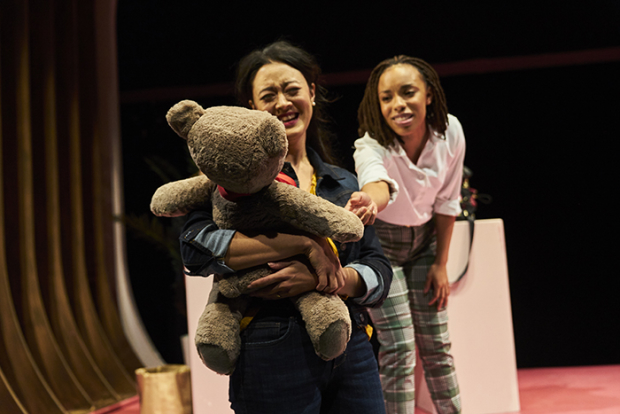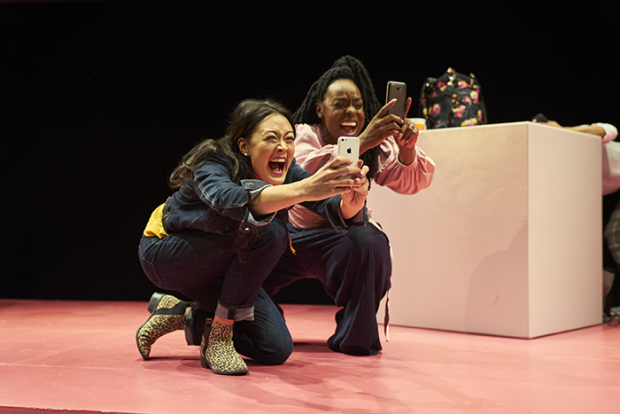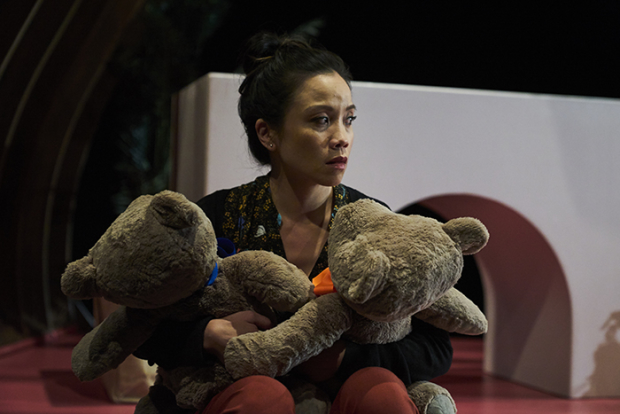In Mothers, Ordinary Mothers Lead Ordinary Lives — Until They Don't
Anna Moench brings a shocking new play about motherhood and survival to Playwrights Realm.

(© Daniel J. Vasquez)
No matter your feelings about Anna Moench's Mothers — a Playwrights Realm world premiere at the Duke on 42nd Street — it's not a play you're going to forget anytime soon. Moench, in collaboration with director Robert Ross Parker, pushes her story beyond dozens of comfort thresholds and off the cliff of did she really just do that? If shock value were the measure of a successful play, there would be no question as to where Mothers stands. But does the play earn all of its dropped jaws? That's debatable.
We meet our characters in the familiarly overwrought environment of a Mommy and Me Gymboree class. Technically, it's a "Mommy Baby Meet Up," not "Mommy and Me," but that distinction matters only to the dreadful women who bring their children to this den of passive aggression. The play begins like your common satire of judgmental moms — the only exception being Moench's inverted universe where people of color are at the top of the social hierarchy and white people (or "beige" as they're called in this world) are at the bottom.
With that in mind, we meet three presumably well-off antagonistic protagonists: Ariana (Maechi Aharanwa), a stay-at-home mother of three, who has befriended Meg (Satomi Blair), a stay-at-home mother of one, whose college friend Vick (Jasmine Batchelor), a working mother of one, has extended a business trip to come pay her old pal a visit in her new baby-centric stomping grounds.
While battling like the cast of Bridesmaids for the affections of their mutual bestie, Ariana attacks Vick for prioritizing work over family, and Vick counterattacks with daggers aimed at Ariana's empty and anti-intellectual life. Vick goes on to chastise Meg for wasting a law school education, and then hits Ariana with a knockout punch of breastfeeding shame (Vick turns out to be the most bountiful lactator of the three). Standing silently in the background, meanwhile, are Gladys (Tina Chilip), an immigrant nanny (even in this universe, immigrants are caretakers), and a "beige" man named Ty (Max Gordon Moore), the lone father at Mommy Baby Meet Up. How do they join the fray? You'll see soon enough.

(© Daniel J. Vasquez)
Moench fires a few warning shots to signal impending disaster. Vick keeps asking about the low-flying planes she hears overhead. Meg claims she's been on a "news diet" ever since an "insurrection" of some kind. And Ariana recounts a situation with cannibalistic hamsters that is detailed far too graphically to be just a superfluous anecdote. Suddenly, Wilson Chin's nonthreatening set — a secure enclosure of simple shapes and a Pepto-pink floor — comes tumbling down. Willful ignorance is a privilege of the past and the whimsical stuffed bears that stand in for babies are not quite so whimsical anymore.
I can't say much more, other than third-world problems become first-world problems faster than anyone is emotionally prepared for. And that's one feather I'll put in Mothers' disturbing cap. If you need a reminder of how tenuous our seemingly most stable structures really are, this is it.
The problem is that the second act of Mothers becomes more an apocalyptic survival story than an examination of the social politics it builds so purposefully in Act 1. If anything, the pecking order collapses into one we already know so well. The beige man seizes all the power (Moore gives us a haunting transition from charming dad to possible war criminal) and the intrepid immigrant woman becomes a ruthless survivor (Chilip delivers a compelling performance despite that being her only character trait).
Standing at the helm, Parker has the difficult job of transitioning from pure satire into a drama with some of the direst situations I've ever seen a playwright attempt to depict onstage. Of course, that transition presumably wouldn't be smooth in real life either, but what remains most unclear is whether we still exist in the heightened and contrived world of before, or if we've crash-landed in the harshest reality you've ever seen (the continued use of the stuffed bears blurs that line in an especially confusing way).
Not that I would refuse the production's few reprieves from its most gruesome realities. I left Mothers feeling plenty disturbed, and significantly less confident about the structures I assume are keeping me safe on a day-to-day basis. But was it worth the emotional distress? Let's just say I left with similar feelings after my first viewing of Twister.

(© Daniel J. Vasquez)








